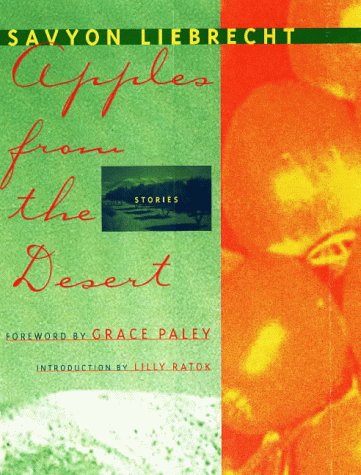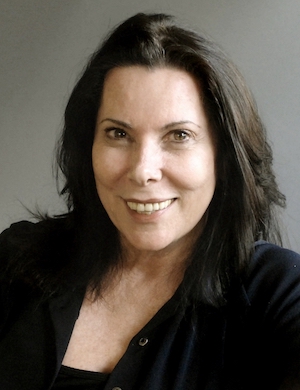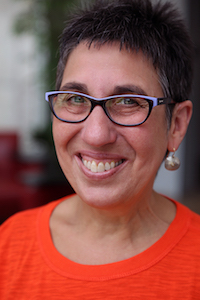
('Verbose, sentimental foolery' © Sarah Ross, 2010)
*
STORIES FROM THE DESERT THAT SPEAK TO THE WORLD
by ELIZABETH EDELGLASS
*
Savyon Liebrecht is one of the great unknown short story writers, and today may be the day for all caring readers to discover her. The many prizes she has won in her native Israel, and in Europe, are evidence of her significance: the Alterman Prize in 1987, the Prime Minister’s Prize in both 1991 and 1999, Playwright of the Year in 2005 and 2006, Italy’s Amelia Rosselli Prize in 2002 and Maior-Amalfi Award in 2005, France’s WIZO Prize in 2009. Yet Liebrecht is largely, and sadly, unknown to a broad audience of English-language readers. Although she’s been publishing in Hebrew since 1986, was translated into German and even Chinese by the mid-1990s, and has continued to be translated into a wide variety of European languages, only four of Liebrecht’s books have appeared in English – Apples from the Desert: Selected Stories being the first, published by The Feminist Press in English in 1998.
Liebrecht is a multi-talented author who has written, and been honored for novels, novellas, plays, and television scripts, but the short story is the form that first brought her acclaim and to which she always returns. Apples from the Desert: Selected Stories in English translation presents the best stories chosen from her first four Hebrew-language books, all short story collections. In the introduction to this English-language edition, Lily Rattok of Tel Aviv University explains that these first four books were all bestsellers in Israel, universally unusual for short story collections. Grace Paley, whose name is synonymous with excellence in short story writing, wrote the foreword to this edition, in which she laments Liebrecht’s relative obscurity on the international stage – even among other Israeli writers – ascribing this not so much to the fact that she is primarily a short story writer, but to the fact that she is a woman. Paley thanked The Feminist Press, as do I, for bringing Savyon Liebrecht to the English-speaking audience.
In 1998, I loved these stories for the ways in which – it seemed to me, as an American – they addressed every issue weighing on Israeli society: Jew vs. Arab, Orthodox vs. secular, Sephardic Jew vs. Ashkenazi, young vs. old, women vs. men, and the special burden faced by Holocaust survivors and their children in modern Israeli society. Rereading these stories in 2017, I see that they are not only timely and specific, but also timeless and  universal. The issues these stories raise – who is powerful and who is weak, who is welcome in society and who is not, and how those with power choose to wield that power over those who are weaker – are issues that Israel continues to face, and they are also very much on the minds of readers and thinkers throughout the world today.
universal. The issues these stories raise – who is powerful and who is weak, who is welcome in society and who is not, and how those with power choose to wield that power over those who are weaker – are issues that Israel continues to face, and they are also very much on the minds of readers and thinkers throughout the world today.
Most of these stories about important issues are told through the eyes and words, and power struggles, of women. In the title story, the author’s first published fiction, Liebrecht needs only a few pages to tackle Israel’s conflict between Orthodox and secular Jews. ‘Apples from the Desert’ tells the story of an Orthodox woman who discovers that her unmarried daughter is happier, and stronger, living on a secular kibbutz with her non-religious lover. Victoria Abravanel has taken the bus from Jerusalem, intending to ‘drag’ her daughter Rivka back ‘by the hair’. But when she steps off the bus to see Rivka coming from work in the chicken coops, with her ‘short hair, the frayed trousers with patches on the back, and the shoes spotted with chicken droppings’, she isn’t so sure of her plan. ‘Not since Rivka was a little girl had she seen her eyes sparkle like this.’ The impact of this first sight of her daughter is confirmed when Victoria hears her speak:
“I, at home… I wasn’t worth much.”
“And here?” Victoria asked in a whisper.
“More.”
One of the longest and most memorable stories, ‘A Room on the Roof’, is twenty-four pages about a woman who is never given a name, just ‘she’, or, from the mouths of the Arab workers she’s hired to build a room on her roof, ‘Lady’. This woman waits until her husband – who is named: Yoel – is called out of the country on lengthy business before she hires these workers, against his wishes. I can’t be the only reader who senses the reference to Virginia Woolf’s ‘A Room of One’s Own’ in this story about the imbalance of power, specifically between Jews and Arabs in Israel, but also universally between men and women. Although we are never told what use the protagonist plans to make of her new room, we know that she needs it. Yet despite her initial determination to strictly supervise these laborers who barely speak her language, she soon loses control.
…how did it happen that on that first evening in November they sat on the edge of their chairs [careful not to ruin the upholstery, eyes downcast], and by December they were already marching through her house like lords of the manor, turning on Yoel’s radio, opening the refrigerator to look for fresh vegetables, rummaging through the cabinet for fragrant shaving cream, and patting her baby on the head?
When she chastises the men for arriving late, they tell her they were held up at an Israeli roadblock. Later, she feels guilty and invites them out of the hot sun into her home for a drink, but she experiences fearful second thoughts when one of them presumes to help himself to coffee from her pot: ‘Could these hands, serving coffee, be the ones that planted the booby-trapped doll at the gate of the religious school at the end of the street?’ When those same hands tenderly comfort her crying baby, she learns that their owner, Hassan, of the broken Hebrew and incomprehensible Arabic, also speaks English far better than her own, having once studied medicine at the American University of Beirut. And when she softens and pays Hassan and his co-workers before the job is finished? They never return, and she is left with a lifetime of second thoughts:
…there was no one else to accuse. She had brought the whole thing down on her own head. And if her baby wasn’t slaughtered […] and nothing bad happened to her – she should bless her good fortune and erase those two winter months from her memory as if they had never been.
Erase the memory. This is one of Liebrecht’s prevailing themes, as she often writes about Holocaust survivors struggling to make new lives in Israel. There’s the unnamed ‘patient’ in ‘Mother’s Photo Album’, whose husband has abandoned her for a new life in America with his recently discovered first wife, the woman he’d never before mentioned because he’d assumed her dead in the war. The ‘patient’ sinks into prolonged psychotic depression, unable to speak to, or even recognise, her son. There is Henya, in ‘Excision’, who shears off her young granddaughter’s beautiful hair in an effort to erase the memory of the lice in the camps – lice that would depart from the heads of women who had died during the night ‘like a black dotted line cutting across the forehead, feeling their way toward another body, looking for a new life for themselves’. And then there is Grandpa Mendel, in ‘Hanuta’s Engagement Party’, who literally drops dead – splayed across the sweets-laden dessert table – from the unbearable effort to hold in his stories of starvation in the camps; a failed effort not to ruin his granddaughter’s party.
 Liebrecht was born in Munich in 1948 to concentration camp survivors who immigrated with her to Israel when she was one year old. I’ve heard her speak on several occasions about the silence that pervaded her family home. She sorts survivors into two categories: those who can’t stop speaking about their wartime experiences, and those who never speak – she writes about them both. Her parents fell into the second category. According to Lily Rattok’s introduction to this volume, the only time Liebrecht’s father ever told her about his life before Israel, he spoke to her in Polish, a language she did not understand!
Liebrecht was born in Munich in 1948 to concentration camp survivors who immigrated with her to Israel when she was one year old. I’ve heard her speak on several occasions about the silence that pervaded her family home. She sorts survivors into two categories: those who can’t stop speaking about their wartime experiences, and those who never speak – she writes about them both. Her parents fell into the second category. According to Lily Rattok’s introduction to this volume, the only time Liebrecht’s father ever told her about his life before Israel, he spoke to her in Polish, a language she did not understand!
Language – the power of words, and the power of silence – proves to be one of the greatest universal themes of Liebrecht’s stories. In ‘A Married Woman’, two young camp survivors are ‘cautious with words, sensing how their wounds gape at the sound of voices’. In ‘The Homesick Scientist’, one of the few stories told from a male point of view, an elderly man eagerly awaits a visit from his beloved nephew long-gone to America, but he worries, ‘How will I talk to him if he has forgotten his Hebrew’. In ‘Mother’s Photo Album’, after the letter from America arrives to reveal the secret of the father’s first wife, the mother begins to speak to her young son in Polish, a language he – like Liebrecht – does not understand. In ‘Written in Stone’, the words finally spoken by a Sephardic mother-in-law – in broken Hebrew – to her Ashkenazi daughter-in-law have the power to save. They come after twelve long years of silently mourning their son and husband who was killed in the Israeli army. For all those twelve years, until the forgiving release of this final conversation, the young widow had been sure her Arabic-speaking in-laws were cursing at her: ‘Great pain is inflicted by a language whose words are unfamiliar but are clearly laced with hate.’
In today’s political climate, with our twenty-first century proliferation of news and communication sources spanning all forms of print and online media, I see, perhaps more than ever before in my life, the power of words to hurt, to alienate, to frighten, and to destroy. I especially see the power of words spoken by the privileged and powerful to threaten the weak, the different, ‘the other’. Savyon Liebrecht waited until she was married with children to publish her first story – perhaps her duty as a second-generation survivor first to preserve the family and then to preserve the stories. From then on, she never stopped writing, using her words to explore and discover value in the lives of those considered ‘the other’ in Israel: the Holocaust survivors of her own family, and also Arabs, Sephardic Jews, the elderly, and women. In her own words (as per this English translation) she refers to Holocaust survivors in ‘A Married Woman’ as ‘refugees’ – those who needed to be spoken for after the horrors of the twentieth century, like those who need to be spoken for today.
Her respect for the power of words may indeed be the reason Liebrecht returns time and again to the short story, the prose form that, due to its brevity, relies so heavily on the importance of each and every individual word. Perhaps it was words that saved Liebrecht from the silence of her childhood home. She is lucky to have found the words, to have found her voice as a writer. But in this day when a mere one hundred and forty characters can destroy a life, we English-speaking readers are far luckier to find Liebrecht speaking in our language, speaking for those who cannot speak for themselves.
~
 Elizabeth Edelglass’s short stories have recently appeared in New Haven Review, Lilith, Tablet, and JewishFiction.Net as well as in anthologies from Demeter Press and Outrider Press. She has won the Lilith short story contest, the William Saroyan Centennial Prize, the Lawrence Foundation Prize from Michigan Quarterly Review and an artist fellowship from the Connecticut Commission on the Arts. She is also an experienced book reviewer, most recently reviewing classics on the American Jewish experience for the Fig Tree Books website.
Elizabeth Edelglass’s short stories have recently appeared in New Haven Review, Lilith, Tablet, and JewishFiction.Net as well as in anthologies from Demeter Press and Outrider Press. She has won the Lilith short story contest, the William Saroyan Centennial Prize, the Lawrence Foundation Prize from Michigan Quarterly Review and an artist fellowship from the Connecticut Commission on the Arts. She is also an experienced book reviewer, most recently reviewing classics on the American Jewish experience for the Fig Tree Books website.


One thought on “Stories from the Desert that Speak to the World”
Comments are closed.